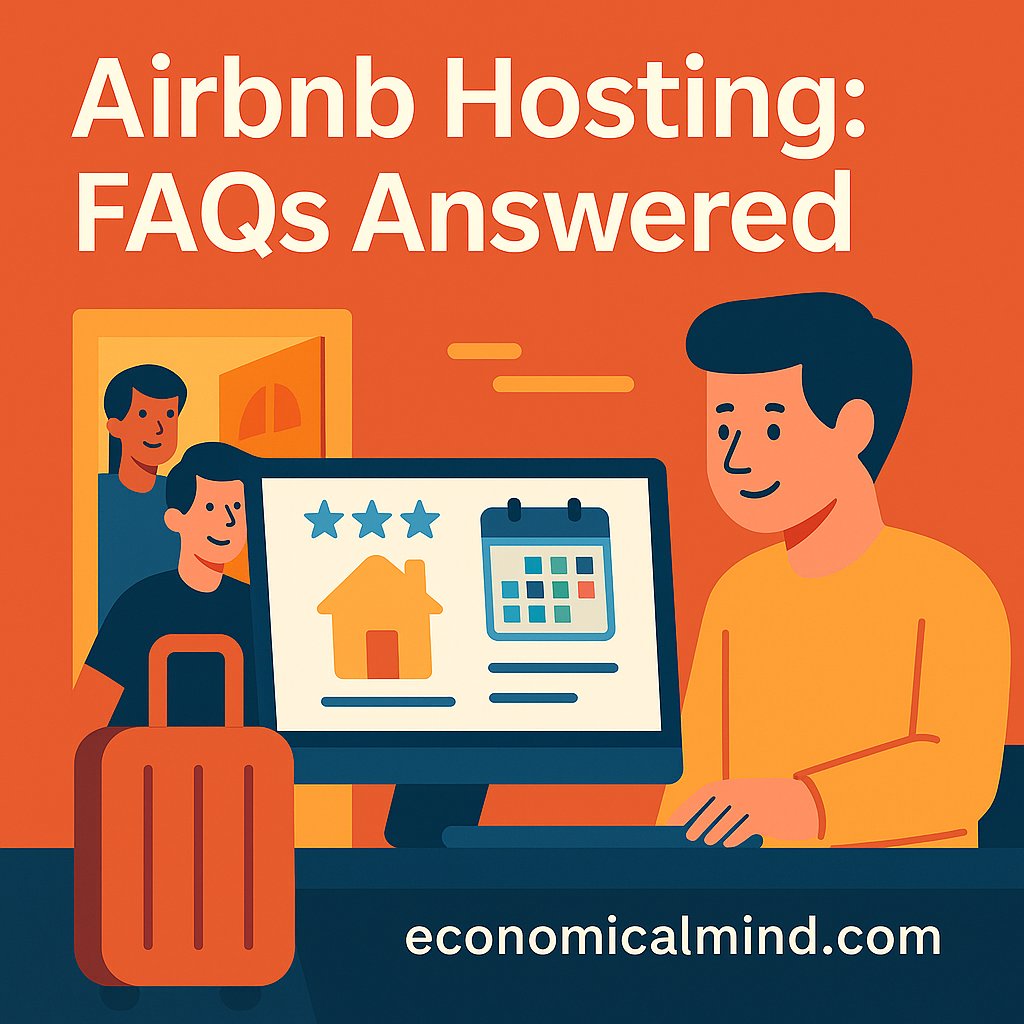
Airbnb has become one of the most popular ways to generate passive income—but being a host comes with its own learning curve. From guest management to tax considerations, understanding how to run your listing effectively can mean the difference between a hobby and a profitable side hustle.
This FAQ guide breaks down everything you need to know to start—and succeed—with Airbnb hosting.
What Is Airbnb Hosting?
Airbnb hosting means renting out your property, or even just a room, to travelers through the Airbnb platform. Hosts can earn money by offering short-term stays while maintaining flexibility over their space.
It’s a flexible side income option, ideal for homeowners, apartment dwellers (with permission), or anyone with an unused guest room.
How Much Can You Make Hosting on Airbnb?
Earnings vary depending on your location, property type, and occupancy rate, but most casual hosts make between $500 and $2,000 per month, while full-time hosts can earn significantly more.
Key income factors include:
- City demand and tourist volume
- Nightly rate competitiveness
- Reviews and ratings
- Seasonality (holidays, local events)
Use Airbnb’s “What’s My Place Worth?” tool to estimate potential earnings in your area.
What Are the Costs of Running an Airbnb?
You’ll want to factor in both upfront and recurring expenses:
- Cleaning supplies or professional cleaning services
- Utilities (electricity, internet, water)
- Repairs and maintenance
- Airbnb service fees (typically 3%)
- Insurance or host protection coverage
While costs exist, efficient management and positive reviews can offset them quickly.
What Tools and Apps Can Help Manage an Airbnb Property?
Here are some top-rated tools used by successful hosts:
- Hostaway: Channel manager for multiple listings
- TurnoverBnB: Automates cleaner scheduling and communication
- PriceLabs: Dynamic pricing tool to optimize nightly rates
- Guesty: Centralized dashboard for bookings, messages, and payments
- Google Nest or August Smart Lock: Simplifies guest access remotely
These platforms help streamline your workflow and minimize time spent on manual management.
Do You Need a Business License or Permit?
In many cities, short-term rental regulations apply. You may need to register with your local government or acquire a short-term rental permit.
Before listing, check Airbnb’s “Responsible Hosting” resource for your city’s rules—violating local laws can result in fines or listing removal.
What Are the Tax Implications of Hosting on Airbnb?
Income from Airbnb is generally taxable. The good news: hosts can deduct many related expenses, such as:
- Mortgage interest or rent
- Cleaning and maintenance costs
- Utilities and insurance
- Supplies and furnishings
Airbnb will issue a Form 1099-K if you meet the income threshold. To stay compliant, track your expenses carefully using software like QuickBooks Self-Employed or Expensify.
How Can You Improve Guest Reviews?
Positive reviews are everything on Airbnb. Here’s how to earn five stars consistently:
- Keep communication fast, friendly, and clear
- Provide spotless cleanliness
- Offer small touches (coffee, snacks, local maps)
- Update your listing with accurate photos and details
- Resolve issues promptly and respectfully
Happy guests lead to repeat bookings and higher search rankings.
What Are Common Hosting Mistakes to Avoid?
Avoid these pitfalls when starting out:
- Underpricing: Cuts profits and may attract poor-quality guests
- Neglecting local regulations: Can lead to fines
- Inadequate cleaning or maintenance: Hurts reviews
- Overpromising amenities: Leads to disappointment
- Ignoring guest messages: Reduces booking potential
Approach hosting like a small business to sustain long-term success.
Can You Host While Living in the Property?
Yes. Many hosts choose “shared-space hosting,” where guests rent a private room while the host lives on-site. This can reduce costs and help maintain security.
If you prefer privacy, consider entire-home hosting, where guests have full access to the space—often at a higher nightly rate.
Bottom Line
Airbnb hosting offers one of the most accessible paths to passive income, especially when managed strategically.
By automating tasks, understanding tax rules, and delivering excellent guest experiences, you can transform hosting into a steady and enjoyable side hustle that fits your financial goals.
Whether you’re renting a spare bedroom or managing multiple listings, a well-run Airbnb can become a cornerstone of your personal finance plan.
